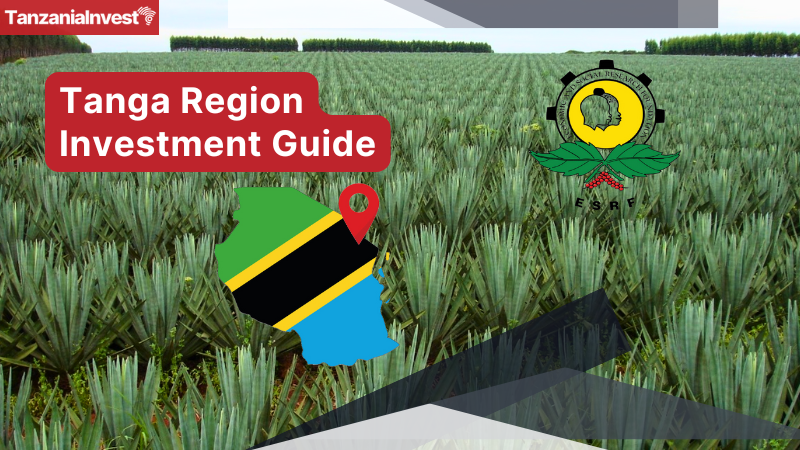The Economic and Social Research Foundation (ESRF) has developed a detailed investment guide for Tanzania’s Tanga Region, outlining key opportunities for both local and foreign investors.
As part of a strategic effort to expand investor outreach, TanzaniaInvest is republishing this guide to highlight investment opportunities and key sectors in Tanga.
Tanga Region is a strategic trade hub in northeastern Tanzania, bordering Kenya and the Indian Ocean. With a modern port, railway access, and road networks, Tanga serves as a critical entry point for trade and industrial development in East Africa.
The region offers investment potential in agriculture, agro-processing, tourism, infrastructure, manufacturing, and energy.
Reasons for Investing in Tanga Region
Strategic position and growing economy
Tanga Region serves as a major gateway to East and Southern Africa, benefiting from its proximity to Kenya and access to Dar es Salaam via road, rail, and port infrastructure. The region is also well-positioned for investments in trade, logistics, and manufacturing.
Investment climate
Tanzania’s favorable trade policies, tax incentives, and investment protections make Tanga an ideal location for business. Investors can benefit from Special Economic Zones (SEZs) and Export Processing Zones (EPZs), which offer tax breaks and streamlined investment procedures.
Infrastructure and services
Tanga Region has modern transport and logistics infrastructure, including the Tanga Port, Tanzania Standard Gauge Railway (SGR), extensive road networks, and an airport. The region is also supported by banking services, energy access, and communication infrastructure.
Socio-Economic Profile of Tanga Region
Geographic and demographic overview
Tanga Region covers an area of 27,645 square kilometers, with a population of approximately 2.6 million (2022 estimate). It has a diverse agro-ecological landscape, supporting agriculture, forestry, tourism, and trade.
Key economic activities
Agriculture is the dominant economic sector, employing 80% of the population. Other key industries include livestock, fisheries, agro-processing, manufacturing, and tourism.
Agro-ecological zones
- Mountainous zone: Suitable for coffee, tea, spices, and fruits
- Coastal zone: Supports coconut, cashew nuts, and horticulture
- Midlands and lowlands: Ideal for maize, oranges, and commercial livestock farming
Priority Investment Opportunities in Tanga Region
Processing and manufacturing
- Industrial parks and SEZs in Tanga City, Handeni, Korogwe, and Muheza
- Agro-processing plants for cassava, cashew nuts, tea, coffee, and horticulture
- Leather processing industries and dairy processing plants
Agriculture and livestock
- Large-scale commercial farming in cashew, sisal, sunflower, and citrus fruits
- Irrigation and contract farming projects
- Animal feed processing and modern dairy farming
Tourism and hospitality
- Hotels, lodges, and resorts in Pangani and Saadani National Park
- Development of marine tourism and eco-tourism projects
- Revitalization of cultural and heritage tourism in Tanga City
Infrastructure and logistics
- Expansion of Tanga Port and marine transportation facilities
- Development of logistics hubs and warehouses
- Construction of modern markets, shopping malls, and conference centers
Energy and environment
- Renewable energy projects, including solar and hydroelectric power
- Expansion of clean water supply and waste management solutions
Facilitation, Processes, Requirements, and Incentives
Supportive policies and incentives
The Tanzanian government offers tax incentives, investment protections, and land access support for strategic projects, particularly in SEZs and EPZs.
Investment processes
The Tanzania Investment Centre (TIC) and Tanga Regional Investment Office facilitate business registration and investment approvals. Land acquisition, financial services, and workforce support are available through local government authorities.
Access to resources
Investors can access readily available land, financial institutions, and an abundant labor force.
Key Contacts in the Tanga Region
Tanga Regional Investment Office
- Website: https://tanga.go.tz/
- Regional Commissioner’s Office
- Address: Tanga, Tanzania
- Telephone: +255 22 2195000
- Email: ras@tanga.go.tz
Local government contacts
- Tanga City Council
- Email: ded@tangacc.go.tz
- Phone: +255 22 244 0172
- Korogwe District Council
- Email: ded@korogwedc.go.tz
- Phone: +255 22 244 0235
- Handeni District Council
- Email: ded@handenidc.go.tz
- Phone: +255 22 244 0381
Disclaimer
This guide provides general investment information for the Tanga Region. It does not constitute legal or financial advice. Investors are encouraged to conduct feasibility studies and environmental assessments.
Accessing the Full Guide
Download the Tanga Region Investment Guide PDF for detailed insights into investment opportunities and facilitation processes.










